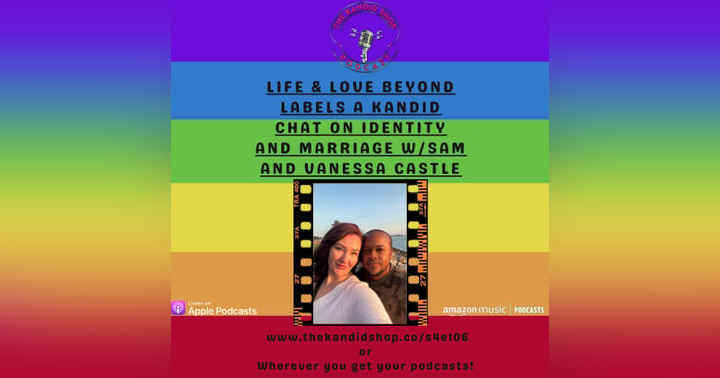On this episode of The Kandid Shop,I sat down with Life Coach Sam Castle and his wife MSW & LGBTQ+ advocate Vanessa Castle for a kandid chat on love, authenticity, and identity. They discuss statistics showing a growing number of non-binary and trans individuals feeling freer to be themselves. Sam and Vanessa share insights on behavioral health, neuro-linguistic programming, trauma-informed coaching, and LGBTQ+ advocacy. Tune in for an enlightening conversation on self-discovery and embracing authenticity.
How do you navigate life when your identity is constantly questioned? In this heart-to-heart episode of The Kandid Shop, I sat down chat with the inspiring duo, Life Coach & Host of the "Be You, Do You" podcast Sam Castle, and his wife Vanessa Castle, an MSW and LGBTQ+ advocate.
Sam opens up about his journey as a transgender man and his work as a Certified Behavioral Health professional specializing in Neuro-Linguistic Programming(NLP) and trauma-informed coaching. Vanessa offers her wisdom as a social worker in a mobile crisis unit, highlighting the importance of self-care and the necessity of setting boundaries.
Join us as we explore the unique challenges faced by Black trans men, shedding light on societal misconceptions and the importance of self-affirmation. Vanessa's compassionate approach as a social worker offers invaluable insights into balancing a demanding career while supporting a partner's transition. We also discuss the dynamics of marriage, where Sam and Vanessa emphasize the need for effective communication, mutual support, and breaking stereotypical gender roles to build a resilient relationship.
From the impact of media on public perception to the crucial need for accessible specialized healthcare within the LGBTQ+ community, this episode covers it all.
Sam and Vanessa share their personal and professional aspirations, revealing their dream to travel and foster LGBTQ+ youth. Tune in to this kandid conversation that celebrates authenticity, love, and growth, and leave feeling inspired to embrace your true self and foster meaningful connections.
Connect with Sam or Vanessa:
https://www.beyoudoyoucoaching.com/
https://instagram.com/beyou_doyou1
https://facebook.com/samcastle
https://www.facebook.com/vanessa.castle.501
Check out The "Be You, Do You" podcast:
https://open.spotify.com/show/235Kp7SogjS42Q26ZKPYN2?si=4a4d1586457a42a7
Intro Music by: Anthony Nelson aka BUSS
https://music.apple.com/us/artist/buss/252316338
Keep it Safe, Keep it healthy & Keep it Kandid!
www.thekandidshop.com
IG, FB & Tiktok: @thekandidshoppodcast
